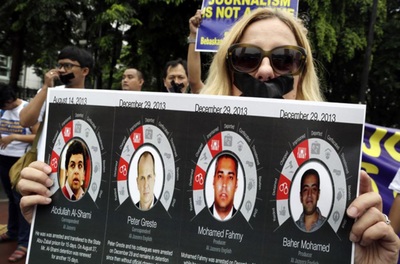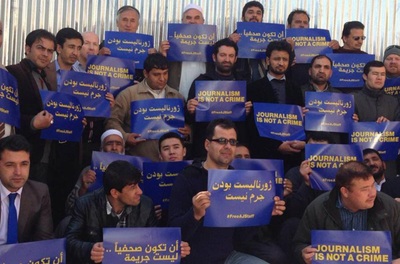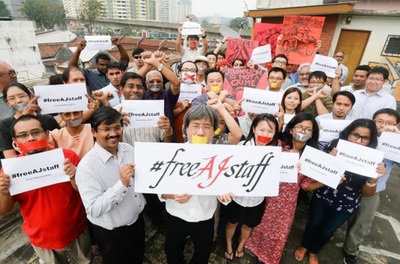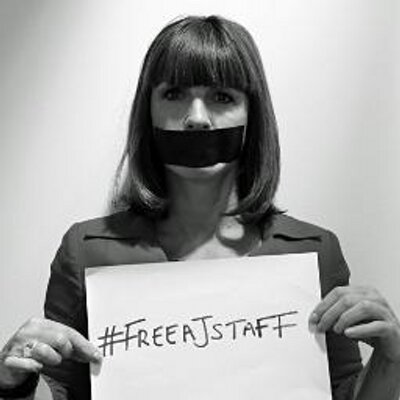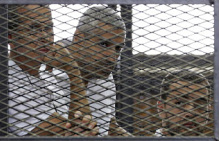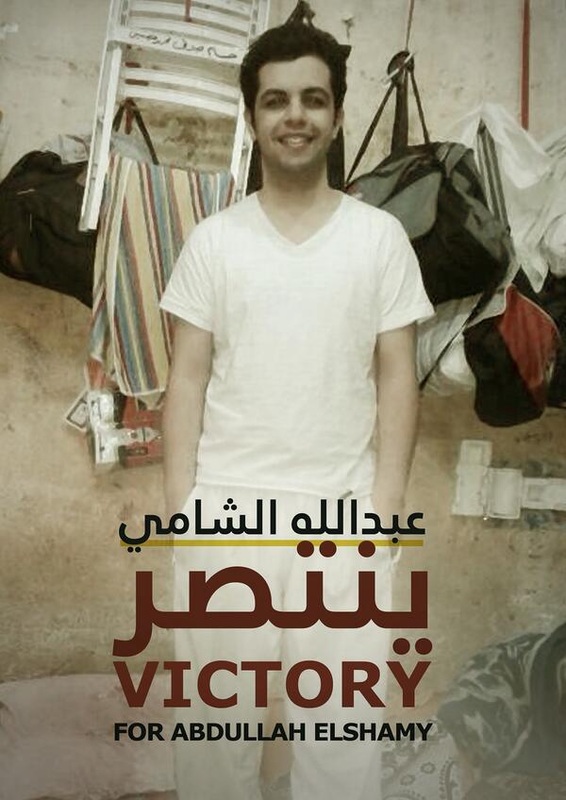Al Jazeera on trial: the commentary
Why should we care about journalists?Monday 23 June, 2013
This woman is a British journalist who was today sentenced to ten years in jail by a court in Cairo. Her crime was to work for Al Jazeera. Fortunately, Sue Turton is based in Qatar and was not in court to hear her fate. Had she been, she would have been wearing a white prison suit and handcuffs and been sitting or standing in a cage. 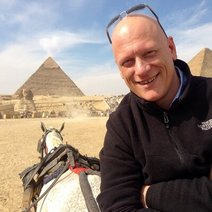 Dominic Kane Dominic Kane
Her colleagues Dominic Kane, who is also British, and Rena Netjes, who is Dutch, received similar sentences.
We have heard little of them today because they were tried and convicted in their absence and are therefore still free. Their work is compromised because they will no longer be able to travel freely throughout the Middle East, but they are still at liberty. The Australian journalist Peter Greste and producer Mohamed Fahmy, who holds dual Canadian and Egyptian citizenship, were jailed for seven years for distorting the news in favour of an outlawed terrorist organisation - the Muslim Brotherhood. Another producer, the Egyptian Baher Mohamed was also given seven years for that crime and a further three for possessing a bullet. The three had been arrested in December, shortly after Greste's arrival in Egypt, had their equipment confiscated and had no knowledge of the nature of the charges against them until they were well into the series of 13 court appearances that culminated in their sentencing today. The evidence was flaky to put it mildly and the scenes in the courtroom, relayed to the world through the tweets of journalists including Patrick Kingsley of the Guardian, Louise Loveluck of the Telegraph and Ruth Pollard of the Sydney Morning Herald, were at times surreal. A judge in aviators yawning through the defence speeches; prosecution evidence that included unexplained videos of sheep grazing and football matches. Here is Sue Turton talking about the case today: Surreal as it was, it was open justice - for example, the defendants would shout to the press during recesses and their comments were reported, something that would never happen in Britain - and while the hearings were protracted, sometimes with weeks between sessions, that was surely preferable to the ten-minute trials in which hundreds of people were sentenced to death en masse.
In Minya two days ago, 183 death sentences were upheld. In the same city today another journalist was jailed simply for covering the news. Mohamed Hegazy, who works for the American Al-Tareq Coptic channel, was sentenced to five years at the misdemeanours court for spreading fabricated news and inciting sectarian strife by falsely reporting that Copts face religious discrimination in Egypt. He had been filming burning houses when he was arrested and his equipment confiscated in December. Today Egyptian ambassadors in Europe and Australia have been summoned to learn of their host countries' displeasure; human rights and journalist organisations have spoken of an end to freedom of speech; David Cameron has given his opinion (although that is somewhat devalued because, like Blair, he is willing to offer it on anything from One Direction to the colour of the Speaker's socks). But will any of that hand-wringing and finger-wagging make any difference? By allowing the trial to run for so long and so publicly, Egypt has shown that it is ambivalent about world opinion - and certainly about the opinion of journalists who have been showing solidarity with the AJ defendants. Yesterday John Kerry was in Cairo to confirm a huge military aid package. He is said to have raised the question of the trial, but with the money virtually in the bank, the judge was sufficiently confident to carry on sentencing. And anyway, should world leaders be getting themselves in a tizz about three journalists (they don't seem bothered about Hegazy)? As journalists we care because they are members of family, but why should anyone else worry? What makes us special? Ah, we say, we have to be free to report, to shine a light on corruption and crime and injustice. To silence us is to silence everyone, for we are there for everyone, the custodians of free speech. So we should be. But for Cameron and Hague to protest about the "appalling sentences" and "unacceptable procedural shortcomings" in the trial of three foreigners in a foreign state is a bit rich given that Britain has just agreed that two men should go on trial in absolute secrecy "in the national interest"; A bit rich from a country that has arrested forty-odd journalists and kept them in limbo on police bail, not knowing if they are to be charged, for up to three years; A bit rich from a Prime Minister who commissioned the £5m Leveson inquiry; an inquiry that resulted in a royal charter that gives courts the right to impose punitive costs on newspapers who don't sign up to an approved club - even when they are found to have done nothing wrong. Of course these hardships are minor compared with being sent to a high-security foreign prison as a "dangerous" inmate because you once interviewed a sheep farmer. But they don't show an overwhelming commitment to free speech and timely, open justice. Injustices anywhere are to be deplored, but with so many around the world, how do we decide which to challenge? Today we have the end of a trial that has captured widespread attention because it involves journalism and that most important commodity free speech. There were about 150 journalists - all with a vested interest - in court to record the verdict. By lunchtime it was on television, radio and leading the Times website, until it was knocked off the top spot by the news that Meriam Ibrahim had been freed. 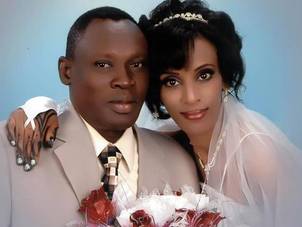
Ms Ibrahim, you may recall, had been sentenced in Sudan to be whipped for adultery and executed for apostasy. She was brought up a Christian but a Khartoum court ruled that she had renounced Islam by marrying a Christian and that the marriage was void - which made her an adulteress. The case caught the attention because Ms Ibrahim was eight-and-a-half months pregnant when sentence was passed and she went on to give birth in chains; her execution was deferred until the child was two.
Hers may have been an exceptional combination of circumstances, but how many other people suffer injustice in Sudan without the world noticing? Back in Egypt, there are believed to be about 15 journalists in jail as a result of their work. How many other people are in prison unjustly? According to Patrick Kingsley there could be 40,000: "This is not a one-off. There are between 16000 and 41000 political prisoners in Egypt. Sentences like this happen every day." And here in Britain, where we have about 40 journalists on police bail, how many others are in the same position? More than 57,000, according to Trevor Kavanagh in today's Sun.
Of course we should be getting worked up about journalists being jailed for doing their job, but it is tenable only if we also emphasise the wider injustices. Because we aren't special people. The whole point of us is that we represent the ordinary man and woman in the street who doesn't have the same opportunity to question authority or to make their voices heard. Given that advantage, we would do well to look at wrongs in our own society as well as those overseas - to worry about violence against women in Britain as well as in warzones, for example - and to be alert to miscarriages of justice at home. That way people like Gerard Conlon, who died yesterday, would not spend 15 years in jail branded a terrorist for crimes they didn't commit. |
|
Peter Greste
Mohamed Fahmy Baher Mohamed 177 DAYS IN CAIRO JAIL FOUND GUILTY SENTENCED TO SEVEN YEARS Al Jazeera on trial
The verdicts The court hearings Storify of Twitter feed Videos Global protests Song of solidarity Editor's pick
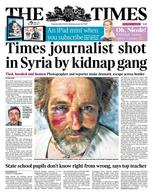


|
Please sign up for SubScribe updates
(no spam, no more than one every week or two)
|
|
|
